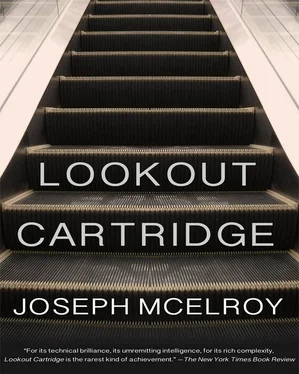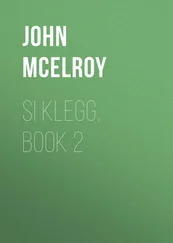Joseph McElroy - Lookout Cartridge
Здесь есть возможность читать онлайн «Joseph McElroy - Lookout Cartridge» весь текст электронной книги совершенно бесплатно (целиком полную версию без сокращений). В некоторых случаях можно слушать аудио, скачать через торрент в формате fb2 и присутствует краткое содержание. Год выпуска: 2014, ISBN: 2014, Издательство: Dzanc Books, Жанр: Современная проза, на английском языке. Описание произведения, (предисловие) а так же отзывы посетителей доступны на портале библиотеки ЛибКат.
- Название:Lookout Cartridge
- Автор:
- Издательство:Dzanc Books
- Жанр:
- Год:2014
- ISBN:9781941088036
- Рейтинг книги:3 / 5. Голосов: 1
-
Избранное:Добавить в избранное
- Отзывы:
-
Ваша оценка:
- 60
- 1
- 2
- 3
- 4
- 5
Lookout Cartridge: краткое содержание, описание и аннотация
Предлагаем к чтению аннотацию, описание, краткое содержание или предисловие (зависит от того, что написал сам автор книги «Lookout Cartridge»). Если вы не нашли необходимую информацию о книге — напишите в комментариях, мы постараемся отыскать её.
Lookout Cartridge — читать онлайн бесплатно полную книгу (весь текст) целиком
Ниже представлен текст книги, разбитый по страницам. Система сохранения места последней прочитанной страницы, позволяет с удобством читать онлайн бесплатно книгу «Lookout Cartridge», без необходимости каждый раз заново искать на чём Вы остановились. Поставьте закладку, и сможете в любой момент перейти на страницу, на которой закончили чтение.
Интервал:
Закладка:
Date of birth, name of father, living, deceased. One Sunday in February after a night tending bar and a dream about dreams, Dagger woke to shouts and clatter, wood hammering wood. He kept his eyes tight shut. He knew it was his friends the little black boys from the bay side who had evidently not found any fallen coconuts in the road to sit down and crack and so had come the three-quarters of a mile across from their side of the island.
They were crucifying one of their number, tying his hands with seaweed and rotten twine to the crosspiece which had been nailed to an upright Dagger through one eye identified by its half-stripped white and black paint as a plank of driftwood he had set on the east side of his lean-to to keep sand from blowing.
Two little girls in bikinis who were at the hotel Dagger worked at were watching from the brink of a trench as deep perhaps as long, from which some of the boys were pelting their happy sacrifice with sand. One little girl jumped into the trench and could barely be seen as she began pitching sand too while the victim loosely strung upon the cross gave exaggerated yells of agony.
It was a good sight and Dagger looked under his plastic poncho for some fig newtons to give out but found a can of beer and sat up and opened it.
Most recent position: his knees cracked comfortably as he crossed his legs.
After he introduced himself into the University of Maryland operation in England some months later and thus gained access to low-priced audio equipment, he became interested in cassette collage, still later in the technical implications of semigratuitous switch-back and switch-forward juxta-sequences using eight-track cartridges, and he planned to work out his own way of cutting to an earlier or later track without having to start at its beginning.
When accused by one of his older U.S. Air Force students of being a closet-radical coming on as a professional discussion-provoker who was in reality a hired conflict-monger, he replied that he was designed to fit most systems.
Name (last name first): Who wants to know? said Dagger, rising when the father in his maroon Bermudas marched the little girls over to the lean-to and demanded to know Dagger’s name.
When Dagger said, Who wants to know? the man said, Never mind who I am, just you explain how come you just sat there in your hobo jungle and let my little girls be subjected to God knows what. Dagger sat down again. But she liked it, he said.
The father said, If I didn’t have these kids with me.
Keeps you out of trouble, said Dagger.
Do you think you own this beach, said the man.
List institutions, looking backward and forward: The little girl was being lifted out of the trench. She was screaming and laughing. She helped the black boys heap up sand for her to stand on to be high enough to have her arms properly tied to the cross. On the ocean side of the trench her sister was jumping up and down.
Date, place of birth: February 1928, Freehold, New Jersey.
Part-time, University of Maryland, U.K. Division, 1963 to present.
But possessed of a full-timer’s card. Which, to his unofficial captain’s status, added access to U.S. Government stores — cameras, liquor, booze, or for instance groceries (which he and eventually his wife Alba with him put in a supply of as a rule one morning toward the end of each week).
6
The silent softball game came first. But five or six weeks after we shot it Dagger said let’s put the Softball Game between the Hawaiian-in-the-Underground and the Suitcase-Slowly-Packed. This left the Unplaced Room first.
Opening our film with a silent softball game might have made us look like Super-8 weekenders, and I pointed this out. But the Unplaced Room had an austere dimension. And a real live U.S. deserter. And something genuine I felt Dagger had helped create without quite knowing what he was doing.
Not that the softball game wasn’t genuine. T. R. Ismay, our retired Wall Street lawyer who lived nearest of any of us to Hyde Park, umpired. Dagger got bats and balls and bases through his Air Force connections, not to mention a catcher’s mask. The bases were the regulation softball distance apart, and the Hyde Park grounds-keepers maybe had never thought about why our bases stayed put, namely with long anchoring spikes. Maybe they didn’t care. Maybe they were thinking of the next tea-break. Or do they work on Sunday?
This Sunday, what with the camera, Dagger didn’t play first. He could use a higher f -number than he’d expected, and hence increase his depth of field, because light under these pleasant English overcasts can turn out to be broader or more solid than you think putting it up against the high blue heavens of New York. But the overcast broke and the clouds that made the sky all the bluer would come and go across the spring sun so suddenly you might have felt that an umbrella was being passed back and forth over our part of the park.
I was at short for an inning, came up once and doubled down the right-field line. I stood on the bag and talked to the second baseman about where he lived — he said he was here and there — I found Dagger getting a long shot of me. I had told him to leave me out of the film.
He did some hollering at Cosmo to watch the side-arm delivery and wrist snap, for Cosmo was pitching. When I left the game and joined Dagger in foul territory between first and home, the Beaulieu was on the tripod ready. The camera seemed alive and way ahead of us.
Jenny stood over the guerrilla-theater boy from Connecticut who’d been playing second when I got my hit. He was waiting on one knee to bat. He stood up, she giggled. He started to turn away, she slapped him on the upper arm. He danced away from her and she ran him up the imaginary third-base line, and Dagger tracked them for four or five seconds. When Jenny tried a few moments later to get into the game in the outfield, Cosmo puffed and frowned and said, Wait three innings.
But then Jenny disappeared.
But my son Will stayed and even got into the film. For when Cosmo unloaded his fastball, a black man from the Bronx who sometimes played if he was down from Oxford for the weekend lifted a foul straight back over the head of Cosmo’s catcher.
This, as anyone would know who recognized the saber scar on the cheek or for that matter the red tan and blue flag on the bulging right arm with forty-eight infinitesimal pricks, or for that matter the depigmentation on the back of his horny right hand, was Savvy Van Ghent, Xavier Van Ghent, the UPI correspondent — and he didn’t push off his mask but turned and plunged after the ball all the way to a pedestrian path and a bench where an elderly couple, kerchief and cap, sat smoking. Dagger panned behind home, then halted, didn’t follow Savvy or the ball. I realigned my eyes to approximate the lens direction. It was a long shot of two men with black hair and white shirts and a woman with apricot hair and a green blouse sitting on the grass ignoring the game — nice touch, Dag — and since my son Will was kneeling near us, Dagger must have caught the crest of his chestnut hair the same shade as Lorna’s when Will turned toward me to point out that in cricket this shot behind the wicket keeper couldn’t have been foul and might have gone for four, and through some narrowing accent forced by the camera I heard my boy’s clear London English instead of — what? — the whole known person I live with who echoing down the stairwell or lecturing us at the kitchen table may seem no more English than American.
We were in color, so my sense of what we shot that opening Sunday is all the closer to what might have emerged from the emulsion had the reel ever been developed. The camera is like a pure glove reaching untouching to the thing it takes. Hyde Park London would not have been anybody’s identifiable turf unless, say, you picked out a policeman’s (or, as American visitors say, a bobbie’s) black helm above a blond beard, or letters on a distant vendor’s white pushcart spelling ice lollies or cornet (which is English for cone ). Dagger never once aimed at three small boys playing cricket, bowler batsman wicket-keeper, and if he did once flick over two veering white triangles you’d have to know Hyde Park well to know they were toy yachts sailing the Serpentine, and I suspect his depth of field wasn’t great enough to pick them up clearly.
Читать дальшеИнтервал:
Закладка:
Похожие книги на «Lookout Cartridge»
Представляем Вашему вниманию похожие книги на «Lookout Cartridge» списком для выбора. Мы отобрали схожую по названию и смыслу литературу в надежде предоставить читателям больше вариантов отыскать новые, интересные, ещё непрочитанные произведения.
Обсуждение, отзывы о книге «Lookout Cartridge» и просто собственные мнения читателей. Оставьте ваши комментарии, напишите, что Вы думаете о произведении, его смысле или главных героях. Укажите что конкретно понравилось, а что нет, и почему Вы так считаете.












